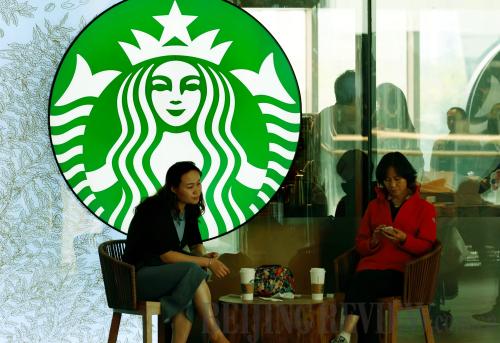|
 |
|
COFFEE TIME: Customers at a Starbucks shop in Beijing (CFP) |
Some years ago, having staggered off from the train that took me on the long ride from Beijing to Changsha, central China's Hunan Province, I found myself embroiled in a desperate quest for a simple cup of hot java. At one point, I had to restrain myself from dramatically dropping to my knees, flinging my arms open, and crying out in the manner of Shakespeare's Richard III, "Coffee! Coffee! My kingdom for a coffee!" Of course I had no "kingdom," merely the remnants of my soon-to-be-depleted stock of U.S. dollars. However, even had I so publicized my dire need for a morning pick-me-up, no one would have likely understood me as my Chinese at the time was not "poor" or "bad," but entirely non-existent.
Worse still was the fact that the room at the first hotel I stopped at offered only tea bags. Even at breakfast the following morning, there was no coffee in sight—a grim reality I was to re-experience time and time again over many months spent slumming in other low-budget accommodation. As is true today, one could easily have just upped and made for a five-star hotel to satisfy his or her coffee fix, but even the most hardened caffeine addict could not justify the injustice of being finished after only two swallows from an inadequately sized gold-gilded ceramic vessel.
It is therefore no wonder that after a few years, I learned to adapt and sample various cha (tea), with and without milk. This was easier than one might think, given the fact that tea with milk had been integral to my childhood and that coffee drinking had been expressly forbidden in our American household.
Exposure to the wide variety of tea and teahouses in the Middle Kingdom has since put me in the habits of collecting tea from various regions and purchasing books on all things tea-related. I unexpectedly found the traditional tea ceremony to be aesthetically relaxing, and the accompanying conversations made my tea exploits all the more fulfilling. Eventually, I stopped blindly passing by traditional teahouses as they greeted me like an old friend and greatly enriched my cultural experiences. To me, it just seemed practical to indulge my morning craving for coffee, and then imbibe tea in the afternoons and/or evenings.
In Beijing, as in many other big cities in China, the quiet revolution of the "tea-coffee war" continues to escalate, as the rampant proliferation of new coffee shops threatens to dwarf their traditional teahouse counterparts. While teahouses may offer the pleasures of a special ambience, a cultural experience, and a spontaneous chat with strangers, coffee shops are in cutthroat competition with one another, serving up enticing "specialty house coffees" to rise above the humble options of espresso, cappuccino or latte.
Rivaling the "big five" Western coffee pushers (Starbucks Coffee, Dunkin' Donuts, Burger King, KFC, and McDonald's) are a slew of other chains which include Costa Coffee, Pacific Coffee and Jamaica Blue. In the past, the "big five" coffee-serving establishments were primarily located near campuses. Today, however, not only are coffee shops prevalent in shopping malls, but even small alleys play host to secluded coffee drinker havens.
Why is coffee presenting such a formidable challenge to tea? This has been the topic of many a culture-centered debate. Someone once suggested to me that the burgeoning growth of coffee outlets in China "is proof that the Chinese want to embrace another element identified as being very 'Western'." Another Chinese person opined, "Well, actually we don't like to drink coffee, but these places are excellent for business meetings or a good place to study or do schoolwork."
Though this issue will remain for now a moot point, I for one am delighted to experience new coffee shops in Beijing, each offering its own unique feel and singularly themed décor. Zoo Coffee is but one eccentric example, with its life-size stuffed animals and wall murals. Also noteworthy are Wei's Café, with its proximity to readers tucked inside some nearby bookstores, and the Coffee Lobby, which features coziness, intimacy, and awesome service.
In the final analysis, changes in public demand arising from the large influx of people from all over the world into China have created the opportunity to meet needs in the many niches of the hot beverage market. Though I am by now comfortable with my morning coffee or milk tea and always travel with sachets of instant coffee within arm's reach, I nevertheless look forward to my evening tea. This equal opportunity routine settles all the fuss about what to drink, ensuring one can enjoy the best of both worlds.
The writer is an American professor working in China |
